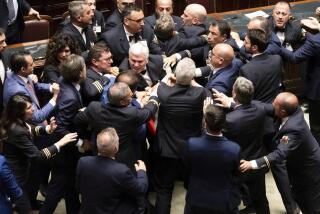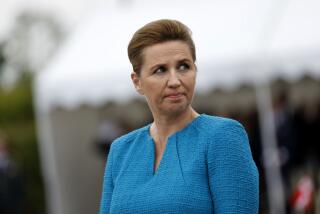Berlusconi attack underscores a sharply divided Italy
- Share via
Reporting from Rome — The weekend assault on Silvio Berlusconi has highlighted how deeply polarizing a figure the Italian prime minister is, as friends and foes dug in even more firmly Monday to their respective positions on his leadership.
Critics declared that, although nothing could excuse such violence, Berlusconi’s clownish antics, scandal-ridden personal life and attempts to manipulate politics to protect his interests had alienated many Italians, and even sparked glee in some quarters over the attack.
But the prime minister’s associates and allies rallied around him, seeking to parlay the general outpouring of sympathy into a boost for his center-right coalition, which has been struggling to govern amid the travails of its controversial leader.
Berlusconi, 73, remained hospitalized Monday with a fractured nose and broken teeth. The hospital said he was in good condition but had lost some blood and was in “persistent” pain, the Associated Press reported.
Berlusconi’s attacker was able to get close enough to hit him in the face with a heavy statuette at a rally in Milan on Sunday. Police identified the suspect as Massimo Tartaglia, 42, who authorities said has a history of mental problems. He was being held at the city’s San Vittore prison, the ANSA news agency reported.
So far there have been no reports of an overt political motivation behind the assault. Graphic footage of the attack has shocked Italians and prompted questions about Berlusconi’s security procedures.
“It’s a bad day for Italy, and all political parties have a duty to make sure that the country does not relive the years of violence” that Italy experienced in the 1970s, said Gianfranco Fini, a member of Berlusconi’s coalition. “It’s an act of violence that can’t be justified.”
But others saw it as an unfortunate outgrowth of the sharply divided country that Italy has become under Berlusconi’s leadership.
“Berlusconi is among the creators of this climate, and he can’t play the victim,” Rosy Bindi, an opposition member of Parliament, told La Stampa newspaper. “These gestures should always be condemned, never justified. But sometimes they are explicable.”
The Italian leader’s critics have been enraged and embarrassed by Berlusconi both on the world stage and at home. As an international statesman, he has referred more than once to President Obama as being “tanned.” In Italy, he is dogged by allegations of throwing parties attended by paid escorts and of trying to pass laws to his own benefit, including one -- recently struck down by the high court -- that gave him immunity from prosecution. He is embroiled in more than one trial over alleged corruption.
On the other side are staunch defenders who see Berlusconi as a playful but intelligent rogue whose business success is to be admired and whose center-right policies, including opposition to immigration, are exactly what Italy needs.
“The country has really been divided by those who hate Berlusconi, who think he is the source of all the problems of Italy, and those who think he is the source of all the solutions of Italy,” political commentator Franco Pavoncello said in a telephone interview. “The situation has been so radicalized that the atmosphere, the air you breathe in this country, is not a nice one.”
Evidence of that quickly surfaced on the Internet in the hours after Berlusconi was struck by a statuette of Milan’s famed Duomo cathedral on Sunday.
Thousands of users joined Facebook groups that implicitly or explicitly praised the attack. One group declared, “We condemn all forms of violence, but the sight of Berlusconi’s battered face is priceless.”
But plenty of groups with even more supporters sprang to the prime minister’s defense.
Commentators on both sides warned that Italy’s polity was in danger of being heavily degraded unless some of the more extreme positions were reined in and replaced by civilized disagreement and debate.
“Nothing less than freedom itself is at stake,” Ezio Mauro wrote in an editorial in La Repubblica, a newspaper that has been a major critic of the prime minister. “Berlusconi’s freedom to expound his politics and his ideas coincide with our freedom to criticize him. This freedom is called democracy: Defend it.”
De Cristofaro is a special correspondent.
Times staff writer Henry Chu in Manchester, England, contributed to this report.
More to Read
Sign up for Essential California
The most important California stories and recommendations in your inbox every morning.
You may occasionally receive promotional content from the Los Angeles Times.













